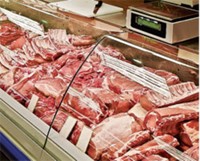Advertisement
Grab your lab coat. Let's get started
Welcome!
Welcome!
Create an account below to get 6 C&EN articles per month, receive newsletters and more - all free.
It seems this is your first time logging in online. Please enter the following information to continue.
As an ACS member you automatically get access to this site. All we need is few more details to create your reading experience.
Not you? Sign in with a different account.
Not you? Sign in with a different account.
ERROR 1
ERROR 1
ERROR 2
ERROR 2
ERROR 2
ERROR 2
ERROR 2
Password and Confirm password must match.
If you have an ACS member number, please enter it here so we can link this account to your membership. (optional)
ERROR 2
ACS values your privacy. By submitting your information, you are gaining access to C&EN and subscribing to our weekly newsletter. We use the information you provide to make your reading experience better, and we will never sell your data to third party members.
Environment
FDA, USDA propose mad cow regulations
July 19, 2004
| A version of this story appeared in
Volume 82, Issue 29
FDA has banned the use of certain cattle tissues in human food, dietary supplements, and cosmetics in response to the discovery of one cow with bovine spongiform encephalopathy (BSE). The banned materials include brain, eyes, skull, spinal cord, and vertebrae from cattle that are 30 months and older. The rule takes effect immediately. In addition, USDA and FDA jointly announced an advanced notice of proposed rulemaking to seek public comments on the following measures: prohibiting the use of all mammalian and poultry protein in ruminant feed and prohibiting meat from nonambulatory (downer) cattle and cattle that die on farms from use in all animal feed. If these proposals are finalized, cattle may no longer be fed poultry litter, plate waste from restaurants, and freeze-dried cattle blood. In a related development, a draft report by USDA's inspector general says the department's BSE testing program is seriously flawed. USDA plans to test about 220,000 cows for BSE by the end of 2005 in a program said to provide statistical assurance of beef safety. However, the survey will result in "questionable estimates" of the true prevalence of the disease, the inspector general's report states, because participation is voluntary and USDA assumes erroneously that BSE occurs almost entirely in downer cattle.




Join the conversation
Contact the reporter
Submit a Letter to the Editor for publication
Engage with us on Twitter